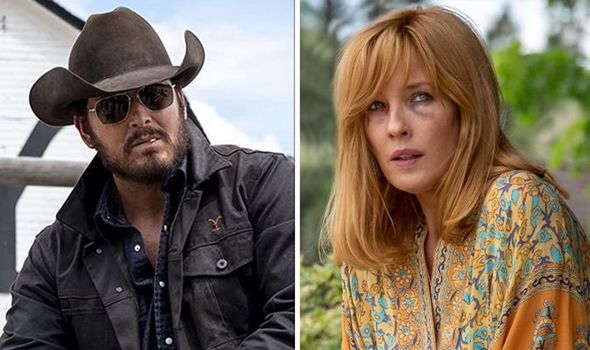
The Brutal Ideal: How Rip Wheeler's Loyalty and Love Justify His Violence in the Eyes of Yellowstone Fans
Rip Wheeler, the enforcer of the Dutton Ranch in the sprawling drama "Yellowstone," is not a man easily defined. He is a creature of the wild west, scarred by hardship and forged in the fires of loyalty. He's a brutal combatant, a man who solves problems with his fists and occasionally a gun. And yet, despite this inherent violence, he's emerged as a surprisingly romantic figure for many viewers, an idealized masculine archetype whose unwavering devotion and capacity for profound love often overshadow his brutality. This phenomenon speaks to a deeper yearning for a traditional, even primal, sense of honor and commitment in a world increasingly perceived as chaotic and uncertain.
One of the most compelling reasons for Rip’s appeal lies in his unwavering loyalty to John Dutton, the patriarch of the Yellowstone Ranch. Rip is not merely an employee; he is John’s adopted son, his protector, and the embodiment of his vision. He takes on the dirty work, the morally ambiguous tasks that John cannot publicly endorse. He sees the ranch not just as property but as a sacred trust, a legacy worth defending at any cost. This loyalty, often manifested through violent acts, is perceived not as senseless aggression but as a sacrifice, a willingness to shoulder the burden of protecting something bigger than himself. In a world where self-interest often reigns supreme, Rip’s selflessness resonates deeply. Viewers admire his unwavering commitment to a cause, even if that cause demands actions that would be considered abhorrent in a more civilized setting. The ends, in this context, often seem to justify the means.
Furthermore, Rip's violence is often framed within a specific moral code. He doesn't revel in cruelty or inflict harm indiscriminately. His actions are usually directed at those who threaten the Dutton family or the sanctity of the ranch. He operates within a system of justice that is admittedly skewed, a frontier code where personal retribution trumps legal procedures. This simplified moral landscape, while problematic in reality, offers a sense of clarity and order that many viewers find appealing. In a world plagued by complex legal battles and moral ambiguities, Rip's direct and decisive actions provide a vicarious sense of control and justice.
However, the most significant factor contributing to Rip's idealized status is undoubtedly his relationship with Beth Dutton. Their love story is a tempestuous blend of vulnerability and raw passion, a testament to their shared trauma and unwavering dedication. Beth, a force of nature in her own right, sees in Rip a kindred spirit, a man who understands her darkness and embraces her flaws. Rip, in turn, sees in Beth a fragile beauty hidden beneath layers of cynicism and armor. Their love is not saccharine; it's born from shared pain and a desperate need for connection.
Rip's devotion to Beth transcends mere affection; it's a fierce, protective love that borders on possessiveness. He would, and often does, do anything for her, even committing acts of violence that would otherwise be considered unforgivable. He defends her honor, avenges her wrongs, and provides a safe haven in a world that has repeatedly tried to break her. This unwavering devotion, this willingness to sacrifice everything for the woman he loves, is perhaps the most compelling aspect of his character. It taps into a primal desire for a partner who will stand by you no matter what, a protector who will shield you from the harsh realities of the world.
Of course, the romanticization of Rip Wheeler's violence is not without its critics. Some argue that it normalizes aggression and perpetuates harmful stereotypes of masculinity. They see Rip as a dangerous figure, a symbol of toxic machismo whose actions should be condemned, not admired. And indeed, a critical examination of Rip's behavior reveals a character riddled with flaws, a man who operates outside the bounds of law and morality.
However, it is crucial to understand the context in which Rip Wheeler exists. "Yellowstone" is not a realistic portrayal of contemporary society; it is a modern-day Western, a drama rooted in the mythology of the American frontier. In this world, traditional values of loyalty, honor, and self-reliance are paramount, and violence is often seen as a necessary evil. Rip Wheeler embodies these values, and his violence, while problematic, is often portrayed as a means to an end, a necessary tool for protecting the people and the land he loves.
In conclusion, Rip Wheeler's appeal lies in a complex interplay of factors. His unwavering loyalty to John Dutton, his fierce protection of the Yellowstone Ranch, and most importantly, his profound and enduring love for Beth Dutton all contribute to his idealized status. While his violent tendencies are undeniable, they are often overshadowed by his perceived virtues, his commitment to a code of honor and his unwavering devotion to those he loves. He is a brutal ideal, a flawed hero who embodies a yearning for a simpler, more defined world where loyalty is paramount and love is the ultimate redemption. This romanticization, however, demands careful consideration, prompting us to examine the allure of violence and the complex ways in which we define heroism in a modern context. Ultimately, Rip Wheeler's enduring popularity is a testament to the power of narrative to shape our perceptions and the enduring appeal of the rugged, loyal, and ultimately, loving, anti-hero.
